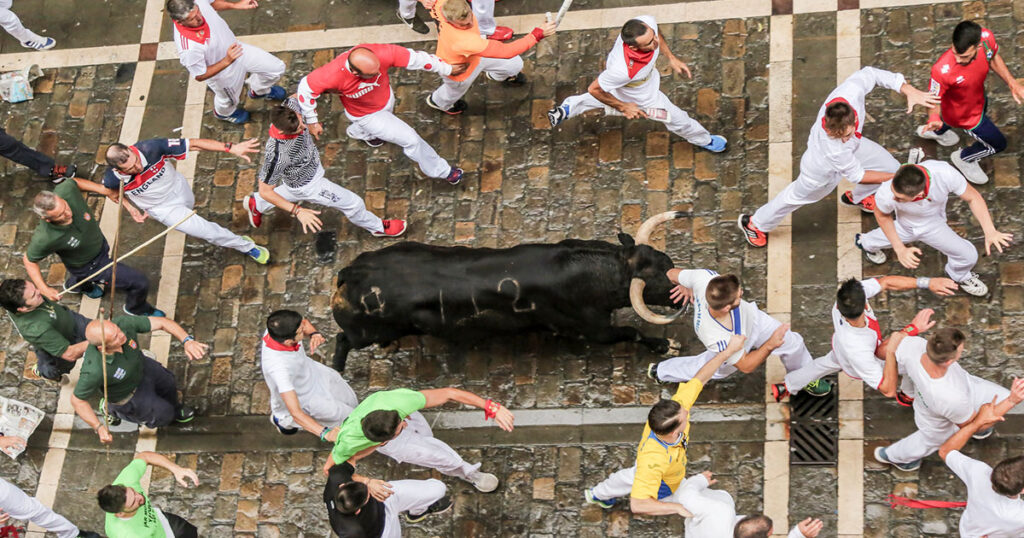
My Spanish father-in-law was a dedicated user of proverbs and sayings. The wisdom of the ages is contained within them, but often camouflaged, making a puzzle, and he liked to ponder their meaning and origin. If you’ve ever thought that the verb ponder is for still and silent reflection, you’ve never met anyone like my father-in-law, pondering, musing, speculating, and entertaining in his own one-person show. The best seat in the house was the armchair in the corner of the room he used when visiting, and the best way to enjoy the show was on a slow afternoon, no plans at all, nothing to do but watch and listen as the seed of an idea took root and grew, like a creeper, becoming thick and dense and eventually filling the room. Sometimes I had to fight my way out of there, into the lovely barren spaces of the rest of the house, in search of air. Sometimes, staggering from his room, endeavoring to clear my head, I’d remind myself that Luis was a man who had been around for a long time and knew a great deal, had lived through the Spanish influenza and survived the Spanish Civil War. And much else. He was worth listening to. Indeed, he was. But first, a break.
Not all his sayings generated the same thoughtful and extensive explanation. One that needed no pondering was Al mal tiempo, buena cara, which means for bad weather, put on a happy face. In English you might say, “Look on the bright side” or “What can’t be cured must be endured,” both meaning “Despair not! Make the best of it!” Here in Asturias, with its gray skies, mists, and drizzle, you might expect all of us to wear a habitual smile along with our rubber boots.
We’re in summer now, though. Besides, the weather is changing. In Asturias, anyway, it’s improving, brightening. But perhaps not this summer’s outlook—no jobs, no money, no tight gatherings at the local fiestas with cousins, aunts, grandfathers, neighbors, kids, and friends. No gently jostling one another on packed beaches. No overflowing terraces. Instead, caution and renunciation, and distance, our new dark clouds, our excuse to despair, our reason to force a smile.
Among fiestas canceled this year was that of San Fermín in Pamplona, Navarra, nine days of uninterrupted festivities starting at noon on July 6. This fiesta, los Sanfermines, is famous for the running of the bulls, the encierro, when each day’s six bulls—and the steers that accompany them to keep them calm—are funneled from the stockyard to the bull ring, in a wild two-and-a-half-minute charge through the narrow streets of the old city. Thousands of spectators gather to watch from windows, walls, and shop doors as hundreds of daredevils race ahead of the bulls and sometimes amidst the bulls. Each morning’s run is filmed and broadcast live, commentaries made, gorings and tramplings replayed, the injured hauled off to the hospital. It’s a spectacle, wild with yelling, pushing, shoving, leaping, running, and it’s there on the TV at 8 a.m., when you are still on your first cup of coffee. “How many mornings does this go on?” Every morning is the answer. “And all these people up that early?” Up early? No, they haven’t gone to bed yet after the night’s rabble-rousing!
In the afternoon, the bulls are fought, all six, and if the first few are tired or frightened and the spectacle is poor, do not lose hope: No hay quinto malo! There is no bad fifth.
Why is that? Possibly because the order of the bulls used to be decided by the owners, not by lottery, with the best saved for the next to last. But it might also refer to the bygone tradition of bullfights with eight bulls and a break halfway through, after the fourth bull, when the spectators would have a bite to eat or a drink. Just like the judge who returns to court after lunch in a more forgiving frame of mind, the crowd after a snack is less critical, more appreciative. They smile. They laugh. They cheer. They clap. And the bright faces have nothing to do with the weather. And, I must add, nothing to do with the welfare of their fellow creatures, charging across the blood-spattered sand in blind fury or panic.
As we on Earth suffer through a summer of face masks and fear, the gods watching the spectacle could be yawning, bored, wondering when they’ll get a real show. No hay quinto malo. Things will improve. If my father-in-law were still alive, would he tremble now, or, reckoning the tally, explain that we’re not yet at the fifth. It’s not over till it’s over. Would he smile, or would he smile?

